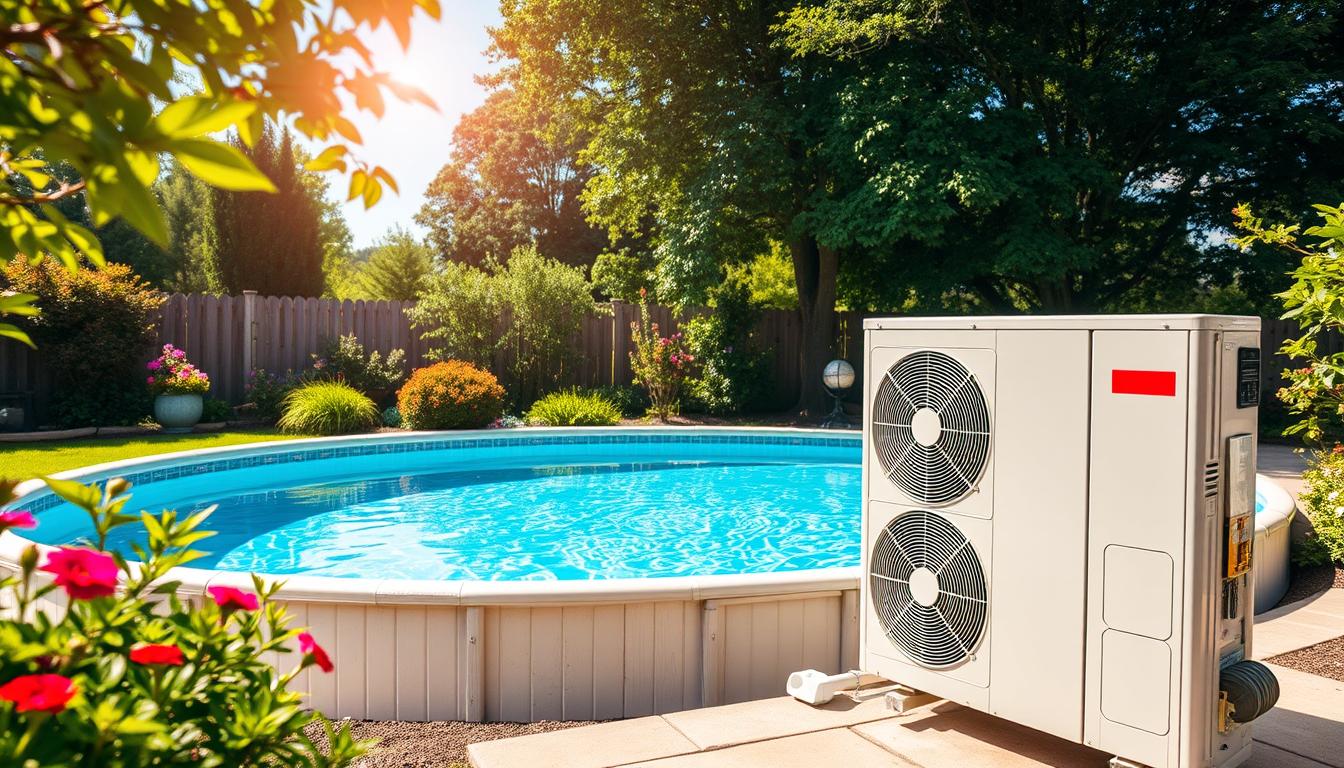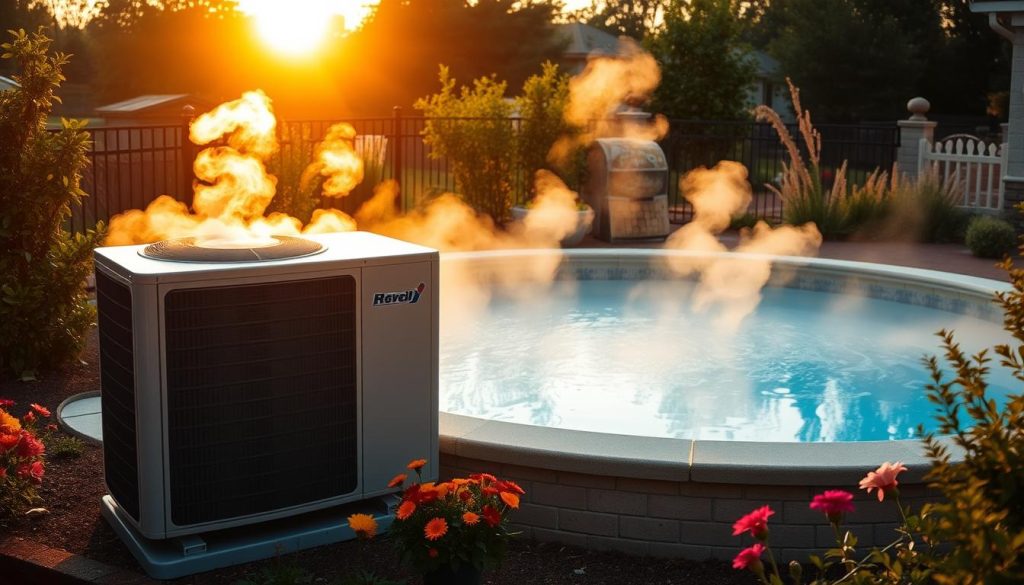
Pool heater pumps offer an impressive 590% return on investment. They provide $5.90 worth of heat for every $1.00 spent to run them. Heat pumps for above ground pools extend your swimming season efficiently and eco-friendly.
These pumps use a small amount of energy to transfer heat from outdoors into the pool water. They’re a cleaner option compared to gas heaters. Let’s explore how these heating systems work and help you choose the best one.
Why Choose a Heat Pump for Your Above Ground Pool?
Heat pumps offer efficient and cost-effective heating for above ground pools. They extend your swimming season and minimize energy use. You’ll enjoy your pool longer while keeping costs down.

Extending Your Swimming Season
Pool heat pumps let you swim in comfort even when it’s cool outside. You can start using your pool earlier in spring. And you can keep swimming well into fall.
This maximizes your pool investment. It also creates more chances for family fun and relaxation.
Energy Efficiency and Cost Savings
Heat pumps are known for their energy efficiency. This leads to big savings for pool owners. Unlike gas heaters, heat pumps use electricity to move heat from the air.
This process is very efficient. Heat pumps provide up to 5 times more energy than they use. You get warm pool water without high energy bills.
Let’s compare the costs of different pool heating options:
| Heating Method | Operating Cost |
|---|---|
| Heat Pump | $200 per month (for a swim season from May to September) |
| Propane Heater | $6.00 per hour (at $3.00 per gallon, burning 1 gallon per hour for every 100,000 BTUs) |
| Gas Heater | $500 per month (when heating water to 80 degrees without a pool cover) |
Heat pumps are more cost-effective than propane and gas heaters. You can enjoy warm water without high operating costs.
Heat pumps provide a 590% return on investment, with about $5.90 worth of heat for every $1.00 spent, compared to gas heaters that get 70-80 cents for every dollar.
Choosing a heat pump saves money and reduces your carbon footprint. They don’t emit harmful gases or pollutants during use. Heat pumps are an eco-friendly choice for pool heating.
How Heat Pumps Work for Above Ground Pools
Heat pumps for above ground pools transfer heat from outdoor air to pool water. This efficient method keeps swimming temperatures comfortable. Understanding this process helps with maintenance and reduces heating costs.
The Heat Transfer Process
Heat pumps use several key components to transfer heat. Pool water circulates through a filter and the heat pump heater. A fan draws in outside air over the evaporator coil.
The coil’s liquid refrigerant absorbs heat from the air, turning into gas. This warm gas passes through the compressor, becoming hot. The condenser then transfers heat to the cooler pool water.
Optimal Operating Conditions
Heat pumps work best when outside temperatures stay above 45°F to 50°F. Lower temperatures make heat extraction harder. This leads to higher energy use and increased heating costs.
Temperature greatly affects heat pump efficiency. Here’s a breakdown:
| Outdoor Temperature | Heat Pump Efficiency | Energy Consumption |
|---|---|---|
| 60°F and above | Optimal (COP 5.0 or higher) | Low |
| 50°F to 59°F | Moderate (COP 3.0 to 4.9) | Medium |
| Below 50°F | Reduced (COP below 3.0) | High |
For best performance, use heat pumps when it’s above 50°F outside. Regular maintenance helps keep them efficient. Clean the evaporator coil and ensure good airflow to extend the pump’s life.
Knowing how heat pumps work helps us use them wisely. We can balance comfort and energy efficiency for our above ground pools.
Selecting the Right Heat Pump for Your Above Ground Pool
Choosing a heat pump for your above ground pool requires careful consideration. Factors like sizing, efficiency, and cost are crucial. Electric heat pumps offer consistent heating, while solar options are eco-friendly.
A pool expert should analyze your pool’s surface area. They’ll consider the difference between desired pool temperature and average air temperature. This helps determine the right heat pump size.
Sizing Considerations
Heat pumps are rated by BTU output and horsepower. Standard sizes range from 3.5 hp/75,000 BTU to 6 hp/125,000 BTU. A 10,000-gallon pool needs a 50,000 BTU heat pump.
Larger pools may require 135,000 to 150,000 BTU heat pumps. Proper sizing ensures effective temperature increase. Your pool’s temperature should rise by 1-1.25 degrees per hour.
Efficiency Ratings and Coefficients of Performance (COP)
Efficiency is measured by the coefficient of performance (COP). Higher COP numbers mean better efficiency. COPs typically range from 3.0 to 7.0, or 300%–700% efficiency.
For every unit of energy used, the heat pump produces 3 to 7 heat units. Gas pool heaters only provide 70-80 cents of heat per dollar spent.
A pool heat pump offers a 590% return. It generates about $5.90 worth of heat for every $1.00 spent on operation.
Estimating Costs and Savings
Operating costs vary based on location, pool temperature, and pool cover use. An electric heat pump costs around $800 for the entire swim season.
A propane heater can cost about $6.00 per hour at $3.00 per gallon. Heat pump prices differ based on features like titanium heat exchangers.
Installation needs a 220v dedicated electrical line and a minimum 30-amp breaker. It also requires buried electrical wire and PVC pipes. Installation usually costs a few hundred dollars.
Proper setup and care by experts can boost your heat pump’s efficiency. This leads to significant savings compared to solar or gas heaters.







